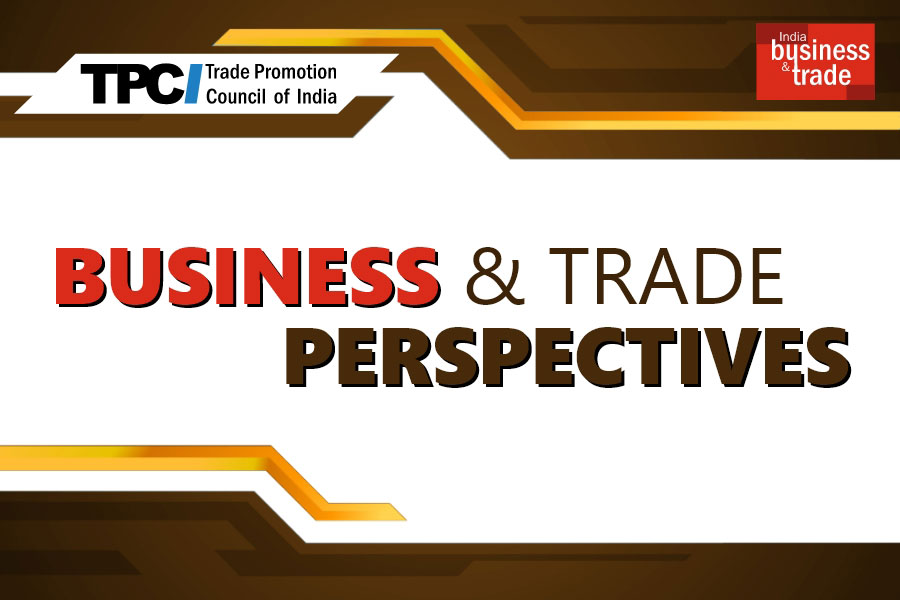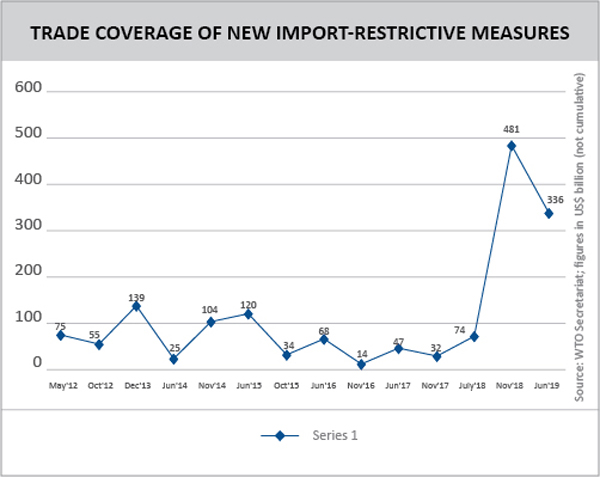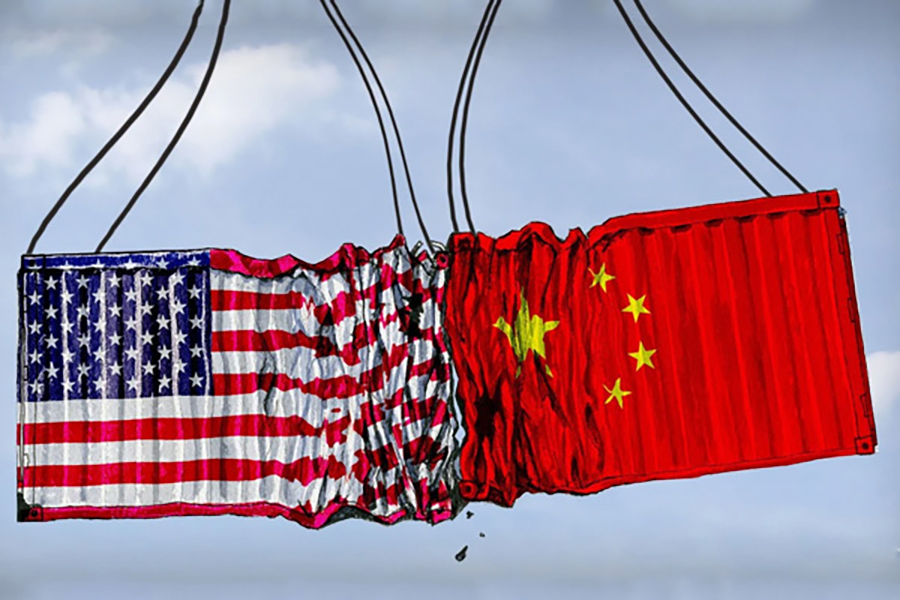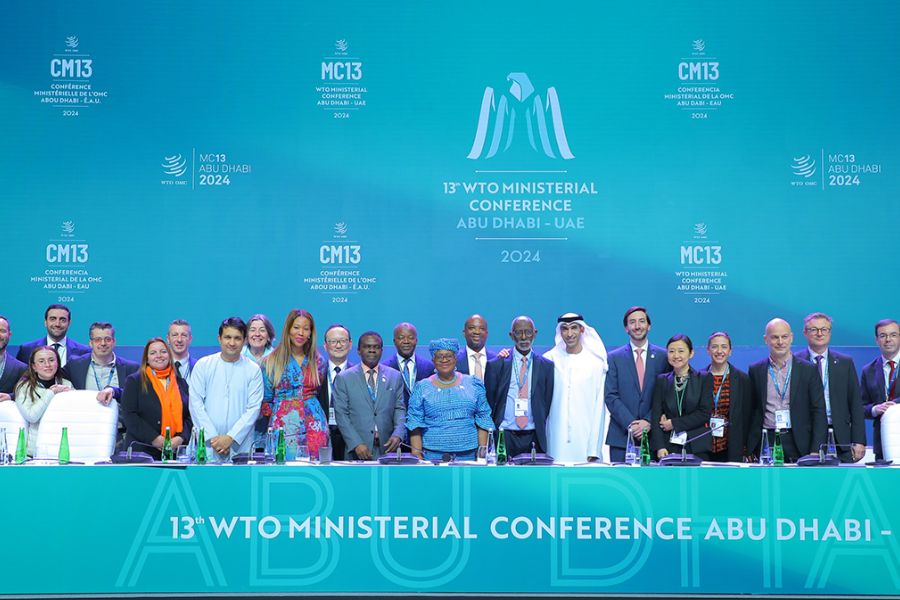G20: Keeping the spirit of free trade alive
• The latest findings of World Trade Organization suggest that G20 members have imposed 20 new trade-restrictive measures between mid-October 2018 and mid-May 2019.
• These measures are related to tariff increases, import bans and new customs procedures for exports. The turbulence caused by the US-China trade war, too, impacted global trade.
• This will have implications related to increased uncertainty, lower investment, weaker trade growth, economic growth, development and job creation.
• Global multilateral forums like WTO must be given more teeth to monitor & curb such practices. Also, countries like India need to urgently build consensus on trade agreements/MoUs with strategic partners.

The Thomas Friedman vision of the ‘flat world’ captured global imagination at the turn of this century. But just over a decade later, that worldview is already showing signs of significant strain. There is a steady shift from the time-honoured principles of globalization, liberalism and free trade to an inward-looking tendency of protectionism, ‘self-reliance’, shunning import dependency and unilateralism. As Russian President Vladimir Putin opines, the ideology of liberalism has become obsolete as the public turned against immigration, open borders and multiculturalism. This has manifested in major events that are transforming the global economic landscape, be it Brexit or the trade war between the world’s biggest economies – US and China.
The fact that there’s been rhetoric and action aplenty around strengthening domestic industry through necessary economic reforms & shielding it from global competition has often been highlighted by the WTO. The 1st Monitoring Report of the multilateral trade body has pointed out that G20 members imposed 20 new trade-restrictive measures between mid-October 2018 and mid-May 2019. This dramatic spike in trade restrictive measures was more than 3.5 times the average since May 2012, when the report started including trade coverage figures.

Source: WTO Secretariat.
The WTO report elaborates that these trade restricting measures are related to tariff increases, import bans and new customs procedures for exports. One such instance was Canada being hit with a number of import bans by China like canola and pork. US tariffs on metals have also impacted many countries such as Brazil, India, Canada, Mexico, South Korea as well as European Union member nations. Further, the US terminated Turkey’s preferential trade treatment in May’19 that had enabled tariff-free access for goods such as car parts and jewellery. Another case in point is the US government pulling the plug on India’s Generalized System of Preferences (GSP) status. India responded by imposing retaliatory tariffs of around US$ 200 million on US$ 1.4 billion worth of 28 US product imports to protect its “national interest”.
India itself has faced increased scrutiny over measures regarded as trade distortion in the past few months. For instance, Australia recently pointed out that the Indian new transport and marketing assistance scheme for farmers introduced in March’19 may have infringed the WTO’s Nairobi Ministerial meet decision on curbing such subsidies. The EU has asked India to explain how the Prime Minister plans to spend Rs 25 lakh crore on agriculture and rural development and double farmers’ incomes by 2022. Brazil has sued India for its sugar subsidies & the US has questioned India’s 5% export subsidy for non-Basmati rice. The Merchandise Export from India Scheme (MEIS) – that subsidises exports – too, has been challenged by US in the WTO; while Japan has dragged India over ICT issues where it accused India of charging excess duties to boost local manufacturing.
The ripple effects
This bid to protect the domestic sector across nations is likely to have a string of global repercussions. For starters, according to Mr Keith Rockwell, Director of Information & External Relations, WTO, a full-blown war could lead to a 17% decline in global trade, higher than the drop during the Great Recession. He further stated, “Between October 2017 and October 2018, measures were put in place affecting US$ 588 billion worth of trade.” This is seven times more than the previous year.
The impact on business is more than evident. In a report titled “Automotive In South Asia: From Fringe To Global“, the World Bank argues that high tariff and non-tariff barriers in the automotive sector in India and Pakistan might have reduced international competitiveness & made cars expensive. Consequently, despite being the sixth largest auto producer by volume in the world, India has less than 1% of global exports.
Recently, the Minister of Commerce & Industry, Shri Piyush Goyal, noted, “The excessive use of non-tariff barriers, both spoken and and unspoken, is seriously impeding market access opportunities for developing countries. We need to remove barriers and facilitate temporary movement of highly skilled professionals to sustain this investment and growth.”
Slowdown in global investment, violation of free trade ideology of WTO, reduction in exports, increase in production costs & the cost of the product, lesser job creation and uncertainty are some of the other effects. United Kingdom, which saw its worst monthly contraction in April (0.4%) since 2016, is a quintessential example of this. Many car companies have shut down in the last few months amidst the growing Brexit anxiety. UK’s exports slowed down due to the US-China trade spat and its employment growth has taken a hit.
The way forward to tackle the twin challenges of protectionism & unilateralism is to de-escalate trade tensions such as the ensuing US-China trade war and to restore faith in multilateral institutions like the WTO. Even as regional trade agreements like RCEP seem untenable, countries like India need to proactively seek opportunity and build consensus on trade agreements/MoUs with strategic partners on a case-by-case basis. Some degree of give and take must be acceptable so that progress in bilateral relationships does not stall. For this governments have to resist the urge for short term political gains.
At the same time, these platforms also need to be reformed so that they can adapt themselves to the changing economic scenarios and ensure equitable development, without jeopardizing the needs of developing countries. Questions related to Special & Differential Treatment (S&DT) need to be addressed carefully, and concerns of developing countries need to be taken into account for contemporary issues like e-commerce. Lastly, there’s a need for internal reforms which facilitate the industry to deal with the challenges of protectionism.













Leave a comment